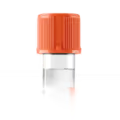Do I need a Cardio IQ Insulin Resistance test?
Struggling with stubborn weight gain, constant cravings, or feeling exhausted despite eating regularly? Could insulin resistance be quietly affecting your metabolism and energy levels?
Cardio IQ Insulin Resistance measures how effectively your cells respond to insulin, revealing whether your body is struggling to regulate blood sugar. This insight helps explain why you might feel stuck despite your best efforts.
Testing your insulin resistance gives you a vital snapshot of your metabolic health, empowering you to personalize your nutrition, exercise, and lifestyle choices to address those frustrating symptoms at their root. Getting tested is your first step toward reclaiming your energy and breaking free from metabolic roadblocks.
Method: Derived from FDA-cleared laboratory results. This ratio/index is not an FDA-cleared test. It aids clinician-directed risk assessment and monitoring and is not a stand-alone diagnosis.

A derived biomarker is a value that is calculated from other directly measured biomarkers rather than being measured directly in the lab.
Get tested with Superpower
If you’ve been postponing blood testing for years or feel frustrated by doctor appointments and limited lab panels, you are not alone. Standard healthcare is often reactive, focusing on testing only after symptoms appear or leaving patients in the dark.
Superpower flips that approach. We give you full insight into your body with over 100 biomarkers, personalized action plans, long-term tracking, and answers to your questions, so you can stay ahead of any health issues.
With physician-reviewed results, CLIA-certified labs, and the option for at-home blood draws, Superpower is designed for people who want clarity, convenience, and real accountability - all in one place.
Key benefits of Cardio IQ Insulin Resistance testing
- Reveals how well your cells respond to insulin before diabetes develops.
- Flags early metabolic dysfunction that raises heart disease and stroke risk.
- Explains stubborn weight gain, fatigue, or difficulty losing fat around the waist.
- Guides lifestyle changes and medication decisions to reverse prediabetes and metabolic syndrome.
- Protects fertility by identifying insulin resistance linked to PCOS and ovulation problems.
- Tracks your progress when making diet, exercise, or treatment adjustments over time.
- Best interpreted with fasting glucose, hemoglobin A1c, and lipid panel results.
What is Cardio IQ Insulin Resistance?
Cardio IQ Insulin Resistance is a calculated score that estimates how well your cells respond to insulin, the hormone that moves glucose from your bloodstream into tissues for energy. It's derived from fasting blood sugar and insulin levels using a mathematical model that reflects the biological conversation between these two key players in metabolism.
Your cells' ability to "hear" insulin's signal
When insulin resistance is present, your muscle, fat, and liver cells become less responsive to insulin's signal. Your pancreas compensates by releasing more insulin to achieve the same effect, leading to elevated insulin levels even when blood sugar appears normal.
A window into metabolic health before disease appears
This score captures early metabolic dysfunction that often precedes prediabetes, type 2 diabetes, and cardiovascular disease by years. It reflects the efficiency of your body's fuel management system and helps identify risk when standard glucose tests still look reassuring.
Why is Cardio IQ Insulin Resistance important?
Cardio IQ Insulin Resistance estimates how effectively your cells respond to insulin, the hormone that moves glucose from blood into tissues for energy. When resistance develops, your pancreas must produce more insulin to maintain normal blood sugar, straining metabolic pathways long before diabetes appears. This test captures early dysfunction across energy metabolism, vascular health, and inflammatory signaling.
Your cells stop listening to insulin's signal
Lower scores reflect better insulin sensitivity. Your muscle, liver, and fat cells readily absorb glucose with minimal insulin. Energy flows smoothly, inflammation stays low, and blood vessels remain flexible. Most people feel steady energy and maintain stable weight more easily.
When the pancreas works overtime
Higher scores indicate insulin resistance. Your pancreas secretes excess insulin to overcome cellular reluctance, raising cardiovascular risk, promoting fat storage around organs, and triggering low-grade inflammation. Over time, this drives hypertension, abnormal cholesterol patterns, fatty liver, and polycystic ovary syndrome in women. You may notice fatigue after meals, stubborn weight gain around the abdomen, and skin darkening in body folds.
The metabolic crossroads
Insulin resistance sits at the center of metabolic syndrome, linking obesity, prediabetes, heart disease, and certain cancers. Catching it early reveals reversible dysfunction before glucose rises into diabetic ranges. It reflects how well your body manages fuel, protects blood vessels, and balances hormones across decades.
What do my Cardio IQ Insulin Resistance results mean?
Low insulin resistance scores
Low values usually reflect good insulin sensitivity, meaning your cells respond efficiently to insulin and glucose enters tissues easily without requiring high insulin levels. This typically indicates healthy metabolic function, lower inflammation, and reduced risk for metabolic syndrome, type 2 diabetes, and cardiovascular disease. Very low scores are generally favorable and not associated with pathology in most contexts.
Optimal insulin resistance scores
Being in range suggests your body maintains balanced glucose-insulin dynamics with appropriate cellular responsiveness. Optimal scores typically sit toward the lower end of the reference range, reflecting efficient energy metabolism and stable blood sugar regulation without excessive insulin secretion. This supports healthy weight regulation, vascular function, and long-term metabolic resilience.
High insulin resistance scores
High values usually reflect reduced cellular sensitivity to insulin, a condition called insulin resistance. The pancreas compensates by producing more insulin to achieve normal glucose control, leading to chronically elevated insulin levels. This metabolic state increases risk for prediabetes, type 2 diabetes, fatty liver disease, polycystic ovary syndrome in women, and cardiovascular disease. Insulin resistance often accompanies central obesity, chronic inflammation, and dyslipidemia.
Factors that influence insulin resistance
Scores rise with weight gain, sedentary behavior, aging, chronic stress, poor sleep, and diets high in refined carbohydrates. Pregnancy naturally increases insulin resistance in the second and third trimesters. Certain medications including corticosteroids and some psychiatric drugs can worsen insulin sensitivity.

.svg)









.avif)
.avif)


